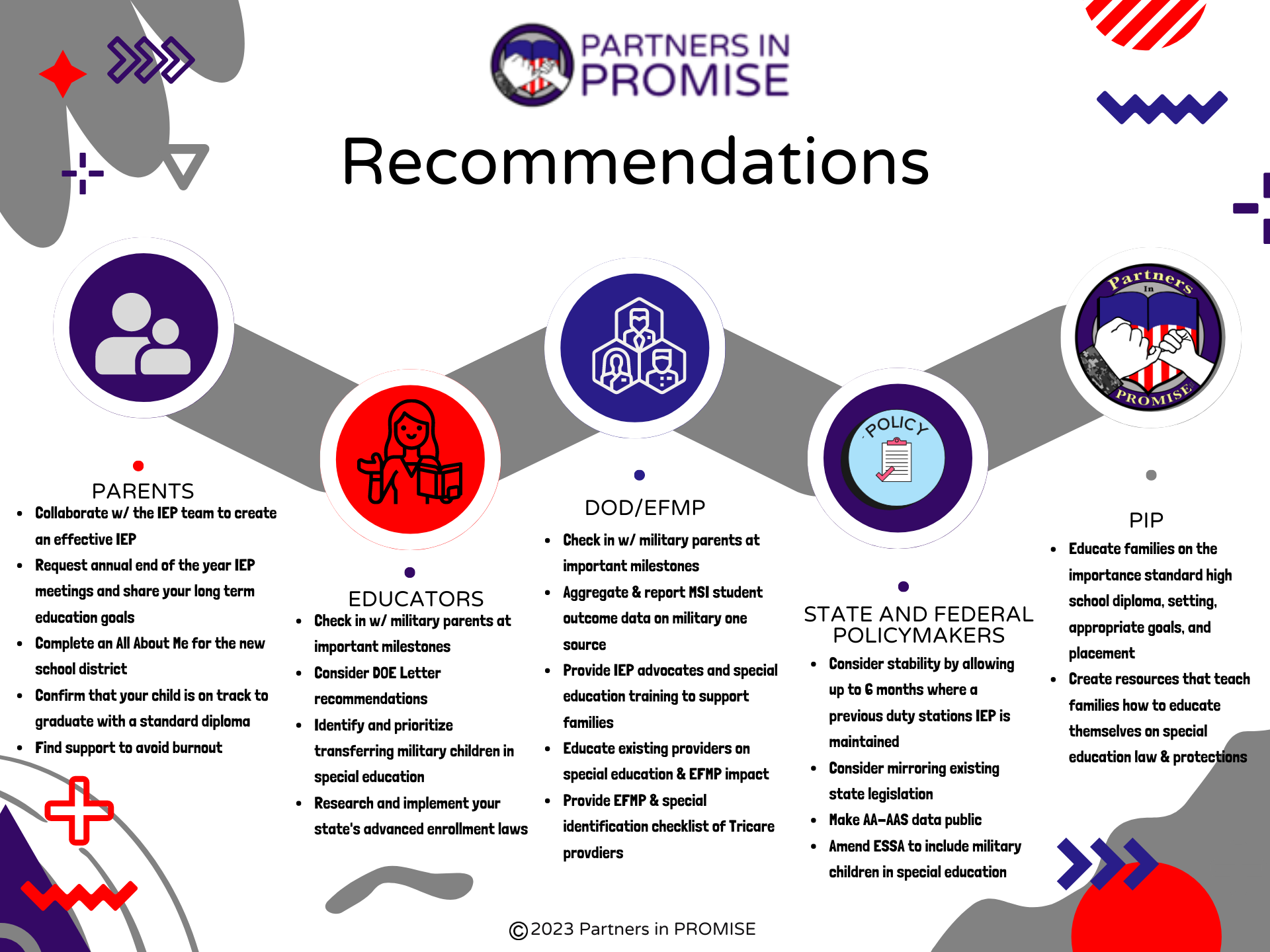
2022 Survey Results
| Survey Data
Are Existing Supports and Standard Outcome Measurements Effective for Military Children?
Our 2020 and 2021 surveys established several baseline measures and show how the highly mobile military lifestyle impacts the ability to receive a FAPE guaranteed by the IDEA. We learned that despite having a cause to file due process complaints, many military families did not feel they could access recourse due to barriers presented by the highly mobile military lifestyle. We also learned that military families had difficulty accessing IDEA protections when they moved from one state to another. In 2022, Partners in PROMISE’s research team wanted to better understand how the IDEA and The Rehabilitation Act of 1973 provisions are implemented through the formation and execution of Individualized Education Programs (IEPs) and 504 Plans, and how effective these IEPs/504 Plans are in helping military students achieve positive long-term outcomes. This led us to formulate the following research questions:
- Do military parents have long-term educational outcome goals for their children?
- Given their highly mobile lifestyle, do military parents believe their child’s annual IEP goals are an effective vehicle to achieve their long-term educational outcome goals?
- Do state-wide standardized testing capture military special education student outcomes?
Partners in PROMISE 2022 Survey Report found below is a summary of what we discovered.
2022 Survey Findings Executive Summary
The United States education system is delivered at the state level and is therefore not built with high mobility in mind. Since military students are a unique population, the 2015 Every Student Succeeds Act (ESSA) requires states to report the standardized testing scores of military students to ensure they receive equal access to a public education. Despite this requirement, state-level testing data available to parents is inconsistent and not centrally accessible, which leaves many parents and advocates wondering what impact the highly mobile military lifestyle has on the educational outcomes of military students. Even less is known about the outcomes of military students in special education, and if and how the military lifestyle impacts the delivery of a free and appropriate public education (FAPE) guaranteed by the Individuals with Disabilities Education Act (IDEA) and Section 504 of The Rehabilitation Act of 1973.
Special education law outlines the processes and procedures designed to ensure all students, regardless of disability, have access to an education by establishing Individualized Education Programs (IEPs), that set individualized goals and accommodations for each student to meet their unique needs. School districts and educators deliver a FAPE through an IEP which is designed to be “appropriately ambitious…[so] every child should have the chance to meet challenging objectives.” Similarly, a 504 Plan outlines specific accommodations the student needs to successfully access their education.
Because so little is known about the lived experiences of military students receiving special education services, our research examined four key elements of the special education system:
- The role of IEPs to deliver a Free and Appropriate Public Education (FAPE)
- The existence of long-term educational outcome goals
- Participation in standardized testing
- Being on track to receive a standard high school diploma
We found that the special education program/plan a child is found eligible for (IEP, 504 Plan or neither) is connected to specific educational outcomes. (Appendix Item A). Families whose children either receive accommodations under a 504 Plan (35.59%) or do not receive accommodations (30.1%) noted that their schools did not recognize the educational impact of their diagnosis or only partially recognized this impact at significantly higher rates than those receiving services under an IEP (20.66%). The perception that their child does not receive appropriate services based on their diagnosis sets families up for future disagreements with school district IEP Team members.
Our second finding was that IEP goals may not adequately support military students’ long-term educational outcome goals. Furthermore, the existence of long-term educational outcome goals is related to the family’s familiarity with special education law, not demographic factors, like military rank, location, or race. This confirmed our previous year’s findings, reemphasizing the importance of a family’s familiarity with the special education law and processes in obtaining positive outcomes for their students. More specifically, 91.3% of participants who were familiar with special education processes and laws cited having a long-term educational goal for their child compared to those who were less familiar with special education. Among this group, only 36.1% cited having a long-term educational outcome goal for their child. (Appendix Item B).
Our third finding related to a commonly cited measurement of student success, standardized testing. Although the majority (63.16%) of military children aged eight and older participated in state-wide standardized testing, this number is lower than state participation rates and the federal alternate assessment guidelines. Therefore, it is unclear how military special education student outcomes compare to their civilian peers. More data are needed to determine if there is a relationship between high mobility, testing participation among military special education, and standardized testing results. Families who reported their child did not participate in standardized tests were also more likely to report that their child was not on track to receive a standard high school diploma (36.95%). Families whose child participated in statewide testing were less likely to report that their child was not on track to receive a standard diploma (12.85%).
This is directly related to our fourth finding, being on track to receive a “standard” high school diploma has a significant relationship with many positive educational outcomes for military special education students. Roughly 58% of parents whose children were on track to receive a standard high school diploma reported that they were also on track to achieve their #1 long-term educational outcome goal; the same could not be said for students who are NOT on track to receive a standard diploma. Only 30% of parents whose children are not on track to receive a standard diploma reported their child was also on track to achieve their educational goals.
Our last finding examined the impact the special education experience had on military families and their special education students. We found that 78.1% of families and students are stressed. Although currently serving families report that the special education system is causing them stress, their experiences do not have an impact on their family’s desire to continue to serve. This is an encouraging finding that further cements the importance of supporting military families in special education. To learn more about our data-informed solutions read our Recommendations to Help Improve the Outcomes of Military Special Education Students.
2022 Survey Infographic
This work would not be possible without the hard work of our Research Team:
Jennifer Barnhill, MPA – Partners in PROMISE – Lead Researcher & Corresponding Author
Dr. Jennifer Kremkow, Ph.D. – Associate Professor/Grad Program Director – Communication Sciences & Disorders, Elmhurst University
Dr. Alyssa Picchini Schaffer, Ph.D. – Scientific Consulting and Communication
Michelle Norman – Partners in PROMISE – Executive Director and Co-Founder
Crystal DeVoss Mahany – Partners in PROMISE – Legal Analyst
Tricia Ross – Partners in PROMISE – Marketing Director
Destiny Huff, Ph.D. Candidate – Partners in PROMISE – Graphic Design
Dr. Amy Shuman, Ph.D. – The Ohio State University (IRB Sponsor)





Leave a Reply